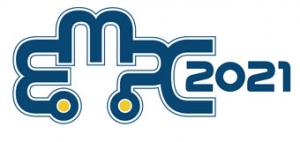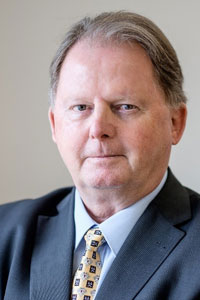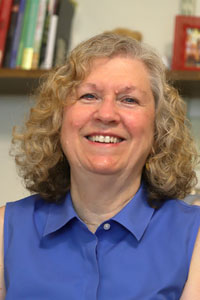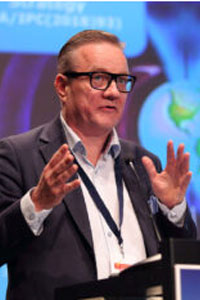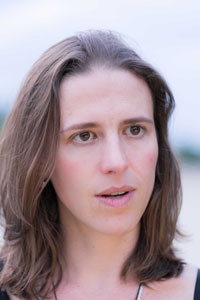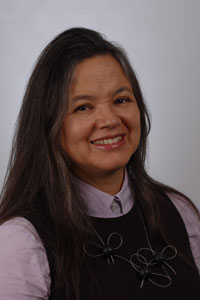Keynotes
EMPC 2021 committee is proud to present confirmed keynotes
Claude Clément, freelance consultant
Topic: Active Implantable Medical Devices: a challenging technological field
The human body is a very special environment. It presents serious limitations to implanted active devices. We all know the difficulties related to biocompatibility and biostability, but there are many new constraints related to miniaturization, energy, communication and connectivity. The presentation will quickly review past and current limitations and continue in assessing future trends in the encapsulation of long term implantable devices.
Biography:
Claude Clément, born in 1955, is from the French speaking part of Switzerland. He has first worked in R&D for the watch industry (Swatch Group), head of the transducers and actuators development group. He entered the world of medical technologies by heading the diversification activities of Swatch in the field of wearable programmable drug delivery pumps. Afterwards, he spent 27 years in the field of active implantable medical devices, as Dir of Manufacturing Engineering at Intermedics (now Boston Scientific), as Plant Manager of the Swiss operations at Medtronic and later as a consultant for major companies, mainly in the field of pacemakers and for various highly innovative start-ups. Starting 1996, he put in place and ramped-up the highly automated factory of Medtronic in the Lake Geneva area. This plant is the world largest site for the assembly of active implantable medical devices, producing large volumes of pacemakers, defibrillators and neuro-stimulators. He later joined the Advanced Concepts research team of Medtronic, focused on implantable devices for programmable drug delivery and communication with implants. Interleaved in these fix responsibilities, he worked several years as an independent consultant in the field of active implants. Until 2014, he was CEO of MyoPowers, a start-up company developing an electromechanical implant to treat severe incontinence. Beginning of 2015, he joined the Wyss Center for Bio- and Neuro-Engineering, as CTO, putting in place and growing advanced projects for long term implantable Brain Computer Interfaces for movement restoration of paralyzed people and interaction with brain circuits. Claude left the Wyss Center in the beginning of 2020 and is currently retired as a freelance consultant in the field of active implantable devices. He is or was founder, chairman or board member of several start-ups and small businesses.
Claude domain of expertise is the encapsulation and interconnection of long-term active implants for human use. He has developed, validated and put on the market several active implants, from cardiac devices to neuro-modulation devices, from drug delivery systems to functional assistance stimulators.
Claude is Chairman of the BioAlps Association, a diversified life science cluster in Western Switzerland. He holds a Master’s (1979) in Electrical Engineering from the Swiss Federal Institute of Technology (EPFL) in Lausanne, and an MBA (1990) from HEC at the University of Lausanne (Switzerland). He holds several patents as inventor or co-inventor and is the author of a book on Brain Computer Interface technologies (Springer, 2019).
E. Jan Vardaman, TechSearch International, Inc.
Topic: Electronics Industry Growth Markets: Package Choices, Challenges, and Trends
The electronics industry continues to see growth in datacenter servers, AI accelerators, 5G infrastructure, and automotive electronics (especially EV). Heterogeneous integration has been discussed for many of these applications. What are the package choices for these application areas and how are the options changing? Will the drive for low-power change the choices? What infrastructure and material challenges does the industry face? This presentation discusses these growth drivers and packaging trends in each area.
Biography:
E. Jan Vardaman is president and founder of TechSearch International, Inc., which has provided market research and technology trend analysis in semiconductor packaging since 1987. She is the author of numerous publications on emerging trends in semiconductor packaging and assembly. She is a senior member of IEEE EPS and is an IEEE EPS Distinguished Lecturer. She received the IMAPS GBC Partnership award in 2012, the Daniel C. Hughes, Jr. Memorial Award in 2018, the Sidney J. Stein International Award in 2019, and she is an IMAPS Fellow. She is a member of MEPTEC, SMTA, and SEMI. Before founding TechSearch International, she served on the corporate staff of Microelectronics and Computer Technology Corporation (MCC), the electronics industry’s first pre-competitive research consortium.
Mikko Nikulainen, Head of the Technical Reliability and Quality Division TEC-QE, European Space Agency
Topic: ESA COTS initiative: How to bring commercial-off-the-shelf technologies to space?
Commercial off the Shelf components (COTS) offer an attractive alternative for space electronics. In fact, there has been a noticeable increase in the use of COTS components for space applications during the past years mainly driven by New Space application. The selection of COTS has been mainly driven by cost, performance and availability. However, there are some key concerns in using Electronic, Electrical, Electromechanical (EEE) COTS, which need to be clearly understood, including where and when the use of COTS should be considered space projects. ESA has launched several initiatives to manage the trade-offs of COTS utilisation and the status of the initiative and the expected output is presented. Furthermore, ESA mission classification and associated challenges related to component selection is discussed.
Biography:
Mr. Nikulainen is a graduate from Helsinki University of Technology (HUT). He has also completed studies in Cranfield School of Management. After graduation, he worked as a research scientist in the HUT Laboratory of Space Technology on advanced RF remote sensing systems. Between 1996 and 1999 Mr. Nikulainen held management positions in the airline industry. He joined ESA in 1999. From 2005, Mr. Nikulainen has led European Component Initiative and became a Head of Division in charge of materials, manufacturing processes and electronic components in 2009. Today, he is in charge of the Technical Reliability and Quality Division in the Directorate of Technology, Engineering and Quality. He is also ESA Executive manager of the European Space Component Coordination (ESCC) and European Cooperation for Space Standardization (ECSS).
Anne Vanhoestenberghe, Associate Professor at University College London, UK; co-founder of the Aspire Centre for Rehabilitation Engineering and Assistive Technology (CREATe); Deputy Director of MAISI
Topic: Reliability of Active Implantable Devices: can we predict, and prevent, failure?
Most research on the reliability of AIMD has focused on the prevention of corrosive failure, by limiting the formation of liquid water over the active electronics parts of the implant. Whilst two approaches, conformal coating or rigid hermetic enclosures, are successfully used in CE and FDA approved devices, the hermetic enclosure is by far the most common.
The large titanium cases with only a few metal in glass feedthroughs in use nowadays are well established. For these, there is no attempt at predicting lifetime in use, the accumulated experience of thousands of years in use has demonstrated that they are sufficiently hermetic, provided poorly sealed batches can be identified and excluded before entering service. It has therefore been sufficient to rely on a simple pass/fail test, based on a leak rate calculated on un-aged packages.
However, as we create new treatments and interventions, using innovative technologies, new materials, and much smaller devices, this approach may no longer be satisfactory. In this talk, I will review the basic assumptions and methods to evaluate the reliability of new AIMD, and discuss whether, and how, we can predict, and prevent, failure.
Biography:
Anne Vanhoestenberghe is Associate Professor at University College London, UK; co-founder of the Aspire Centre for Rehabilitation Engineering and Assistive Technology (CREATe); Deputy Director of MAISI, a national facility for the Manufacture of Active Implants and Surgical Instruments dedicated to support the translation of research to first use in human; and Past Chair of the UK chapter of the International Microelectronics Assembly and Packaging Society (IMAPS). She is a visiting academic with the School of Biomedical Engineering & Imaging Sciences, Kings College London, UK and the Bio, Electro And Mechanical Systems Department, School of Engineering, Universite Libre de Bruxelles (ULB), Brussels, Belgium. She trained as an engineer in Belgium (ULB) and The Netherlands (Eindhoven), holds a PhD from the University of London (2007), and has worked in Germany (IMTEK, University of Freiburg) and Australia (University of New South Wales, Sydney), where she contributed to the development of the Bionic Eye. She has 20 years of experience in the field of active implantable medical devices, and electrical stimulation to improve the quality of life of people living with chronic conditions. Her research focuses on the development and protection of electronic devices for human implantation (corrosion, conformal coating and hermetic packaging); long-term reliability and lifetime prediction of new technologies; and applications of neural engineering, in particular electrical stimulation, neuromodulation and EMG control of artificial organs.
Dr. Ivonne A. Herrera – Senior Adviser working as National Contact Point at the Norwegian Research Council
Topic: “Horizon Europe – possibilities for the European Microelectronics and Packaging industry”
The EU is officially launching its new research Work Programme, Horizon Europe in 2021. Horizon Europe is the EU’s key funding programme for research and innovation with a budget of €95.5 billion. It tackles climate change, helps to achieve the UN’s Sustainable Development Goals and boosts the EU’s competitiveness and growth. The programme facilitates collaboration and strengthens the impact of research and innovation in developing, supporting and implementing EU policies while tackling global challenges. It supports creating and better dispersing of excellent knowledge and technologies. Which opportunities are available for the European Industry, Research Institutions and Academia within Microelectronics and Packaging?
Biography:
Dr. Ivonne A. Herrera (female) is a Senior Adviser at the Norwegian Research Council (Oslo, Norway) working as lead National Contact Point for Horizon Europe Cluster 4 Digital, Industry and Space. Previously, she worked as Senior Scientist at SINTEF Digital and as Associate Professor at the Norwegian University of Science and Technology (NTNU). Ivonne has degrees in electrical engineering (Colombia), Masters in Aeronautical maintenance and production (France) and PhD in Safety Management and Resilience Engineering (Norway). She has 30 years’ experience in industry and research regarding avionics engineering, air traffic management, safety and resilience. She worked as project coordinator or partner for several national and international projects (aviation, petroleum, healthcare, ICT and secure societies). Ivonne was vice-chair of the Clean Sky 2 Joint Undertaking Scientific Committee. Since 2004, she has been an independent expert acting as an evaluator, reviewer of research activities in FP6, FP7 and H2020 and as a speaker at many European Commission events. She is currently President of the NGO global network on resilience – Resilience Engineering Association
